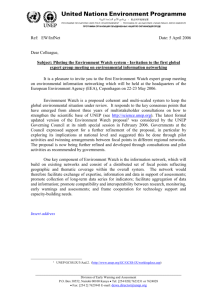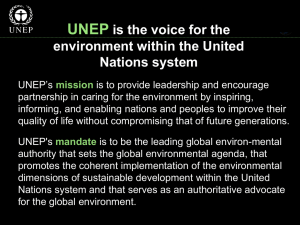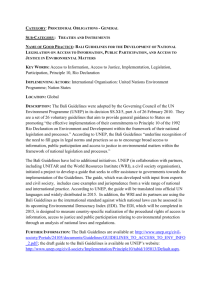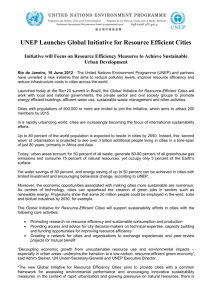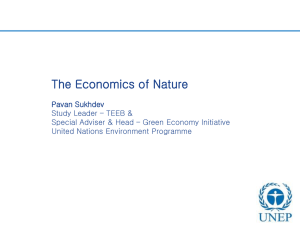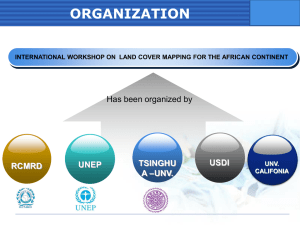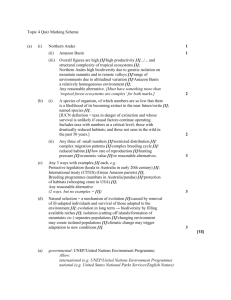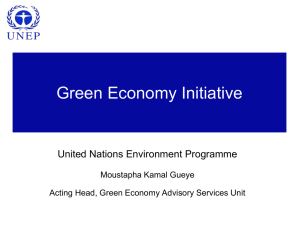Report on the activities of the Environmental Training Network
advertisement
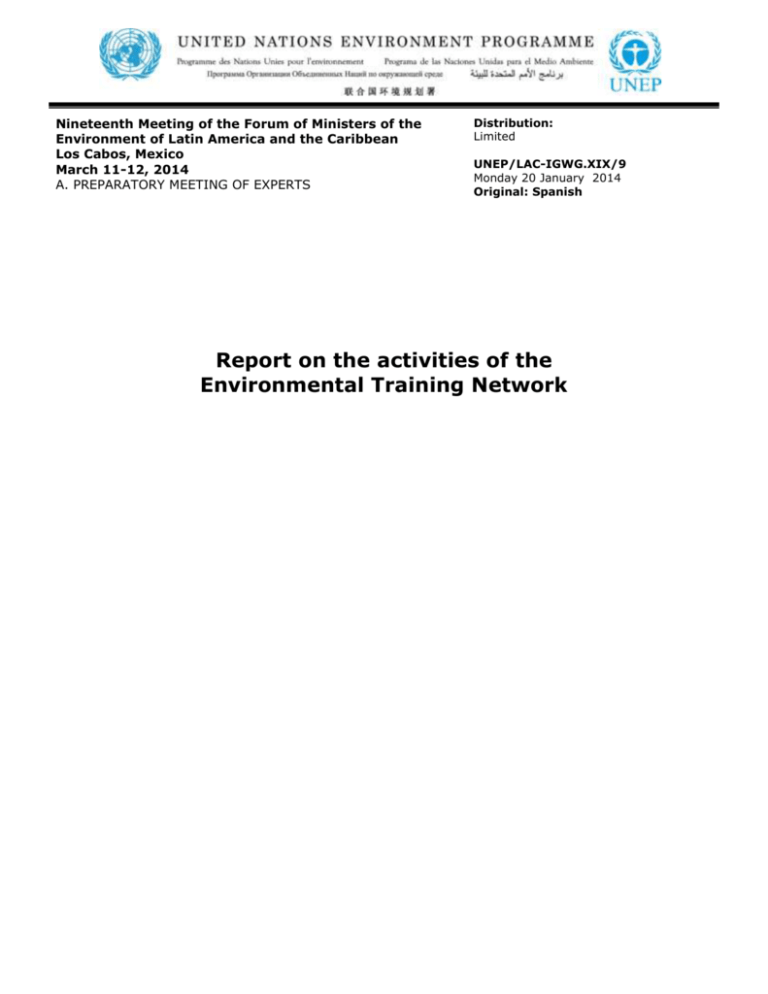
Nineteenth Meeting of the Forum of Ministers of the Environment of Latin America and the Caribbean Los Cabos, Mexico March 11-12, 2014 A. PREPARATORY MEETING OF EXPERTS Distribution: Limited UNEP/LAC-IGWG.XIX/9 Monday 20 January 2014 Original: Spanish Report on the activities of the Environmental Training Network UNEP/LAC-IGWG.XIX/9 I. INTRODUCTION 1. The 18th meeting of the Forum of Ministers of the Environment of Latin America and the Caribbean held from January 31 to February 3, 2012 in Quito, Ecuador, adopted Decision 2 on Education for Sustainable Development. This report describes the activities developed by governments in the region, various organizations and UNEP towards the implementation of that decision, as well as the results achieved. 2. The ideas for strategic action for the next period will be submitted to the Forum in a document issued from the meeting of focal points of the Environmental Training Network for Latin America and the Caribbean to be held on February 26 and 27 in Bogotá, with co-funding and technical support from the Ministry of the Environment and Sustainable Development of Colombia. The focal points are the environmental education directors of the ministries of the environment of the region. 3. Decision 2 on Environmental Education for Sustainable Development is available in the Forum final report: http://www.pnuma.org/forodeministros/18ecuador/ESPANOL%20Informe%20Foro%20de%20Ministros%20vf.pdf II. IMPLEMENTATION OF DECISION 2 ON ENVIRONMENTAL EDUCATION FOR SUSTAINABLE DEVELOPMENT 4. Decision 2 on Education for Sustainable Development contains six operative paragraphs that address: a. Strengthening the Environmental Training Network for Latin America and the Caribbean, coordinated by UNEP (this, in turn, includes eight more concrete actions). b. Continuing support for the countries, from a technical standpoint, towards the implementation of the Latin American and Caribbean Environmental Education Programme (PLACEA) and the Andean Amazonian Communication and Environmental Education Plan (PANACEA). c. Promoting the active participation of the universities of the region in the Global University Partnership for Environment and Sustainability (GUPES). d. Strengthening or creating environmental education and citizenship participation units of the Ministries of Environment. e. Promoting South-South cooperation among the countries of Latin America and the Caribbean. f. Requesting that UNEP prepare a report on the activities undertaken and the resources used in environmental education in the region over the past three years since December 2011 within the framework of the Environmental Training Network, as well as a report on the resources currently available in the Financial Fund Trust. 5. In order to specify the thematic priorities of ministers, UNEP convened a meeting of the focal points of the Environmental Training Network on 18 April 2013 in San José, Costa Rica, following the UNESCO meeting of the subregional consultation of Latin America on planning the programme framework of Education for Sustainable Development (ESD), which took place from April 16 to 17 in that city and was one of the monitoring activities of the United Nations Decade of Education for Sustainable Development (2005-2014), and with whom UNEP collaborated financially. The focal points agreed on a 2012-2013 work plan for the Network, included in the meeting report 2 UNEP/LAC-IGWG.XIX/9 (http://www.pnuma.org/educamb/reunion_ptosfocales_CostaRica/Memoria140513.pdf ). 6. Annex 1 contains a table that summarizes the actions taken to implement Decision 2 following the guidelines agreed upon by the focal points. 7. Importantly, the activities have received financial contributions from the Environmental Training Network for Latin America and the Caribbean, the Environmental Education and Training Unit of UNEP Headquarters, and various partners, in particular, the universities associated with the Alliance of Iberoamerican University Networks for Sustainability and the Environment (ARIUSA). III. ASSESSMENT OF THE IMPLEMENTATION OF DECISION ENVIRONMENTAL EDUCATION FOR SUSTAINABLE DEVELOPMENT o 2 ON Universities and the environment 8. With regard to the actions implemented linked to universities: 9. The Latin American Chapter of GUPES was launched on December 3, 2012 in Bogotá, Colombia, at the University of Applied and Environmental Sciences (UDCA). This event took place only six months after UNEP’s official launch of GUPES on June 5 and 6 of that year at the University of Tongji, Shanghai, China. 10. GUPES aims to promote the integration of environment and sustainability concerns into teaching, research, community engagement, the management of universities including greening of university infrastructure/facilities/operations, as well as to enhance student engagement and participation in sustainability activities both within and beyond universities. 11. In full agreement with the decision of the Ministers of the Environment of Latin America and the Caribbean, since the proposal of GUPES was presented during the first half of 2012, all the networks that make up ARIUSA decided to join UNEP’S GUPES initiative and create GUPES-Latin America (GUPES-LA). 12. GUPES-LA operates as a joint working agenda for the Environmental Training Network for Latin America and the Caribbean (ETN-LAC), global UNEP and ARIUSA. Other Environmental University Networks in the region may join this agenda, while maintaining their autonomy. The universities participate in GUPES-LA through their environmental networks and specific activities of the common agenda on which they collaborate. 13. The most important task carried out in 2013, as set forth in the GUPES-LA, ETNLAC and ARIUSA joint work agenda, was the organization of the National and Latin American Universities and Sustainability Forums. Results: 14. According to the ARIUSA report (see list of references below), based on the cooperation agreement with UNEP in June 2013: “The First Latin American Forum of Universities and Sustainability Forum (9-12 December 2013; Viña de Mar, Chile) completed the series of National Forums of the same name or equivalent events held in 10 countries in Latin America and the Caribbean between February and December 3 UNEP/LAC-IGWG.XIX/9 2013. Most of these events were convened by the Alliance of Iberoamerican University Networks for Sustainability and the Environment (ARIUSA), UNEP's Environmental Training Network for Latin America and the Caribbean and GUPES Latin American Chapter. 15. In all cases, the organization and nearly all of the funding for these events, both national and regional, were assumed by one or more Universities and University Environmental Networks members of ARIUSA. This demonstrates the high level of commitment of institutions and university networks to coordinated actions planned and implemented under ARIUSA. It is also a clear demonstration of the benefits of 'networking', which emerged as one of the 'pillars' of the GUPES Global Alliance, also adopted and implemented by ARIUSA since its inception in 2007. # Country 2013 Dates National Forums and similar events First Global Universities Partnership on Environment and Sustainability National Forum 1 Guatemala February 14 and 18 2 Venezuela March 21 to 23 First Venezuelan Congress on Environment and Development 3 Peru April 19 Seminar-Workshop "University Environmental Responsibility" 4 Cuba July 8 to 11 Annual Meeting of the Environment Network and Network of Environmental Managers in Cuban Universities 5 Argentina August 16 6 Brazil 7 Costa Rica Fourth Seminar on University Sustainability: September 15 to 19 Challenges to the Greening of Higher Education Institutions in Brazil REDIES Best Environmental Management Practices: Applied Focus October 18 Colombia October 24 and 25 First Colombian Sustainability" Forum 8 9 Chile October 24 First Meeting of Campus Network the November 14 Second Forum on "Environmental sustainability on college campuses” Dominican 10 Republic First Regional Forum in Universities and Sustainability University, Socio- Argentina "Universities National on and Sustainable 16. One of the great achievements was the high number of environmental events during the year (10 national and 1 regional event) organised by more than a dozen Environmental University Networks and more than two hundred Latin American and 4 UNEP/LAC-IGWG.XIX/9 Caribbean universities. 17. Following these University and Sustainability Forums and equivalent events, the task remains to assess the results and the effects they contribute to the process of greening the universities in the region. 18. Aware of this situation, representatives of ARIUSA networks who participated in the First Latin American Forum began to analyse and evaluate reports from the 10 National Forums on Universities and Sustainability during this event. The analysis and evaluation of the First Latin American Forum on Universities and Sustainability should be included. 19. One of the major challenges for the first half of 2014 is to identify the contributions of all of these events to establish a clear picture of the current status of this process. Despite the individual and collective efforts of the Universities and Environmental University Networks of ARIUSA to implement their commitment to sustainability, they know very little about the general process in which they are participating.” 20. And the report on the results of national fora on environment and sustainability (see list of reference below) highlights: "2) On the relationship of networks and universities with the Ministries of Environment and Education in each country. 21. Relations between universities and university networks with the Ministries of Environment and Education vary in each country. In Peru this relationship is very close and the Ministry of Environment has a specific area of cooperation with universities ... 22. In other countries, the Ministry of Environment is part of the management of the network of universities and participates in decision making or research activities. In some cases partnerships have not been formalised and in other cases there are tensions for different positions on certain issues.” 23. Activities with universities also benefited from the financial support of UNEP's Environmental Education and Training Unit to participate in events outside of the region including: The GUPES 'Green Room' during the 27th UNEP Governing Council (February 2013, Nairobi, Kenya). During this event, UNEP also launched a global publication on Greening universities toolkit transforming universities into green and sustainable campuses (UNEP, 2013): http://www.unep.org/training/docs/Greening_University_Toolkit.pdf) which is being translated and adapted to the region. The Seventh World Environmental Education Congress (June 2013, Marrakech, Morocco). Networks of Argentina (Argentinean Network of Universities for Environment and Sustainability (RAUSA for its initials in Spanish), Brazil (University of Sao Paulo), Chile (University of Valparaiso), Costa Rica (Costa Rican Network of Educational Institutions) Dominican Republic (Environmental Network of Dominican Universities (RAUDO or its initials in Spanish)), as well as the West Indies University and the Université d'Etat d'Haiti (UEH) actively participated in the GUPES event. The "Academia Partnership Forum" (APF) during the Sixth Global South-South Cooperation Expo 2013, October 28 to November 1 in Nairobi, Kenya. During the session on sustainability indicators for universities, the University of Sao Paulo in Brazil and the Autonomous University of Madrid presented the state of the environmental sustainability of universities in Latin America based on a current study to prioritize sustainability indicators (e.g., reduced carbon emissions, greening practices of universities, environmental curricula development and implementation 5 UNEP/LAC-IGWG.XIX/9 (according to the preliminary report, for example, there has been an 82% increase in the reduction of carbon emissions (2007-10) and a 53% increase in sustainable practices (2007-10) within university facilities). 24. In the framework of the climate change programme and the Environmental Training Network, UNEP facilitated the participation of a professor from the College of the Bahamas in the "Education for Sustainable Development/Climate Change Education for Sustainable Development Workshop" held from 13 to 15 May at the Mona Visitors' Lodge & Conference Centre of the University of the West Indies in Mona, Jamaica. o Exchange of experiences between Ministries of the Environment of the region 25. Through virtual meetings, UNEP fostered the exchange of experiences among the Network focal points. Four virtual meetings were held between May and December 2013. The issues addressed, based on the initiative of the respective focal points, included: Uruguay: Framework Programme for the Sustainable Management of Water Resources of the La Plata Basin in Relation to the Effects of Climate Variability and Change (CIC Framework Programme) and the Centre for Social and Environmental Knowledge and Care of the River Plate Basin. Panama: Environmental education programmes of the National Environmental Authority. Peru: The prize for environmental citizenship. Colombia: The National Youth Environment Network. 26. Presentations and reports of virtual http://www.pnuma.org/educamb/reuniones.php meetings are available at: Results: 27. The focal points that attended the virtual meetings have rated the results positively, however the technology platform has yet to be improved to ensure the stability, quality and scope of communication (e.g., not all ministries are able to use platforms like Skype or click meeting). o Latin American and Caribbean Programme on Environmental Education (PLACEA) 28. Under the coordination of the Cuban focal point, the UNEP Training Network also supported the meeting of sub-regional representatives of the Network focal points on the implementation of the Latin American and Caribbean Programme on Environmental Education (PLACEA) within the context of the 9th Congress on Environmental Education for Sustainable Development and the 9th International Convention on Environment and Development held in Cuba, to share experiences, criteria and proposals for action aimed at the effective implementation of PLACEA (Havana, July 10, 2013). 6 UNEP/LAC-IGWG.XIX/9 29. The meeting agenda and report prepared by the Cuban focal point in consultation with other focal points are available at: http://www.pnuma.org/educamb/reuniones.php. 30. One of the issues agreed upon at the meeting was that a questionnaire on PLACEA developed during the meeting would be sent to focal points through the Training Network. UNEP sent the questionnaire to the focal points and followed up to obtain their responses. Results: 31. Six questionnaires (Cuba, Brazil, El Salvador, Paraguay, Panama and Uruguay) were received and other countries planned to send them after the deadline. As of the time of preparing this report, Cuba was in the process of analysing the questionnaire results on PLACEA. o 7th Iberoamerican Congress on Environmental Education (September 2014, Lima, Peru) 32. In December 2012, the Ministry of the Environment of Peru informed UNEP of its intention to convene and organise the 7th Iberoamerican Congress on Environmental Education in September 2014 and requested the support of UNEP. The Network focal point thus participated in the 9th Congress on Environmental Education for Sustainable Development in Cuba to announce the Iberoamerican Congress, which has also been publicized through the UNEP website and networks. 33. In addition, on September 26 and 27, 2013, the Ministry of the Environment of Peru organised an international meeting of environmental education experts in Lima to discuss and define the criteria of the Congress. Thus, it is expected that the theme of the Congress will be 'Educating together for the sustainability of life' and its purpose will be: to contribute to the sustainability of life and the construction of environmental citizenship from the experiences and proposals of community-based environmental education in Latin America'. Among others, topics covered include: a. Foundations of community-based environmental education: multiculturalism, dialogue and cultural rationalities. b. Intercultural dialogue, input from communities, NGOs, industry, academia and intercultural universities, government. c. Systematized experiences on community-based environmental education (e.g., border management, sustainable production systems, water management and climate change, food security and sovereignty, mining). d. Coordination of networks and institutions in community-based environmental education. e. Community-based environmental education and construction of environmental citizenship. Environmental Governance: Building collective environmental rights. f. Relations between universities and communities on environmental issues. g. Research on community-based environmental education. h. Community-based environmental education in the media, social networks and other public spaces. i. Community-based environmental education in literature, the arts, the interpretation of the natural and cultural heritage. 7 UNEP/LAC-IGWG.XIX/9 34. UNEP participated in the meeting and also supported the attendance of experts. Results: 35. Thanks to the initiative of the Ministry of the Environment of Peru, the next Iberoamerican Congress on Environmental Education (the seventh one) will be held after five years the previous one was held in Argentina in 2009. The Ministry of the Environment also has the support of the Ministry of Education, which marks a very important step in the relation between the two sectors for environmental sustainability. The focus of the Congress on community-based education is novel and represents a big challenge. Ensuring the presence of community representatives and experiences will be instrumental in publicizing their experiences and needs while analysing the articulation of local formal, non-formal, intercultural and other educational processes and global processes and regional environmental challenges. o Collaboration with UNESCO in the framework of the Decade of Education for Sustainable Development (2005-2014) 36. As mentioned above, the sub-regional consultation for Latin America for planning the programme framework of the UN Decade of Education for Sustainable Development (EDS) was held from April 16 to 17, 2013 in San José, Costa Rica (2005 2014). This was one of the follow-up activities of the ESD Decade. The meeting, organised by UNESCO, UNEP and the Costa Rican Commission, was attended by representatives of Ministries of Education, Ministries of the Environment, NGOs, universities and youth organizations, among others. UNEP presented its contributions to the Decade in Latin America and the Caribbean and supported the involvement of ministries of the environment to strengthen the bond and coordination with the ministries of education (ESD focal points). 37. The objective of the sub-regional consultation was to help ensure transparent, participatory preparation of the post-2014 ESD programme framework that considers the interests, needs and lessons learned from Latin American countries. More information may be accessed at the following link: http://www.orealc.cl/educaciondesarrollosostenible/consulta-de-costa-rica/?lang=en 38. The sub-regional consultation for the English-speaking Caribbean called by UNESCO was held in Kingston, Jamaica, from 3 to 4 April. UNEP also provided support for the incorporation of ministries of environment, which resulted in the participation of the Ministry of Water, Land, Environment, and Climate Change in this event. More information available at: http://www.orealc.cl/educaciondesarrollosostenible/consultasub-regional-para-el-caribe-en-jamaica/?lang=en Results: 39. Through their regional offices, UNESCO and UNEP maintain close collaborative relationships that enhanced communication between the Ministries of Education and Environment. These linkages will allow the region to substantially contribute to the definition of the post ESD Decade agenda emphasizing Latin American and Caribbean priorities. 8 UNEP/LAC-IGWG.XIX/9 o South-South cooperation between Latin America and the Caribbean countries 40. At the meeting of the Network focal points held on April 18 in San Jose, countries agreed to include the following issues in the 2013-2014 work plan: Support initiatives related to environmental education and community involvement in shared basins issues (e.g. the Framework Programme of the River Plate Basin, Central River Plate Basin Knowledge Centre). 41. In this context, and given the interest of the Guatemalan focal point in understanding the experience of environmental education at transboundary basins, UNEP developed a first draft proposal for the First International Exchange of Experiences on Environmental Education and Public Participation in Shared Watersheds: Plata River Basin and Coatán River Basin between Mexico and Guatemala. The Coatán River Basin was selected for the activities coordinated by the IUCN as part of the BRIDGE/IUCN project (Building River Dialogue and Governance); in the case of the Plata River Basin, initial exchanges were conducted through the Uruguay focal point for the test pilot project on sustainable and joint management of the CuareimQuaraí River Basin. 42. For more information on the Framework Programme for Sustainable Management of Water Resources of the Plata River Basin in relation to the effects of climate variability and change, see: http://pmarco.cicplata.org/index.php 43. More information on the BRIDGE project is available at: http://www.iucn.org/es/sobre/union/secretaria/oficinas/mesoamerica_y_caribe/?1342 2/Proyecto-BRIDGE-en-Mesoamerica-Rios-que-Unen-Fronteras Results: 44. The drafting of the proposed South-South collaboration generated a great interest in developing the activity and expanding its scope; there is still a need to resume the operational aspects of the initiative, identify additional financial resources and define meeting dates in 2014. o Financial contributions to the trust fund 45. In April 2012, UNEP submitted the requested report on the status of voluntary contributions to the Network trust fund to the ministers of the region. The report is available at: http://www.pnuma.org/documento/Final%20INFORME%20ETN%20Abril%202012_ESP .PDF 46. Also, at the meeting of the Network focal points held on April 18 in San Jose, countries agreed that UNEP would send a letter justifying the renewal of the contributions to the fund, to be prepared by the focal points themselves. On June 17, the letter was sent to Ministers. Results: 47. Positive responses were received from Chile, Colombia, Mexico, Peru and Uruguay. Further efforts are expected to increase the regularity of contributions to the Network Fund to ensure the continuity of the activities. 9 UNEP/LAC-IGWG.XIX/9 o Dissemination 48. The Environmental Training Network updated its website and much of the abovementioned information may be found there. See: http://www.pnuma.org/educamb/. A Facebook profile was also created for the Network. See: https://www.facebook.com/reddeformacionambiental.alc. The UNEP ROLAC bimonthly newsletter also reported the activities of the Network. See: http://www.pnuma.org/publicaciones.php. IV. ANNEX 49. Annex 1. Summary of compliance with decision 2 on education for sustainable development. V. LIST OF REFERENCE DOCUMENTS Decision 2 on Environmental Education for Sustainable Development is available in the Forum final report: http://www.pnuma.org/forodeministros/18ecuador/ENGLISH%20Report%20Forum%20of%20Ministers%20vf.pdf . 2012-2013 Work Plan of the Environmental Training Network contained in the report of the focal points meeting held on April 18, 2013 http://www.pnuma.org/educamb/reunion_ptosfocales_CostaRica/Memoria140513.pdf . Activity Report of the University of Applied and Environmental Sciences (U.D.C.A.). Greening universities toolkit transforming universities into green and sustainable campuses (UNEP, 2013): http://www.unep.org/training/docs/Greening_University_Toolkit.pdf Reporto on the results of the First Latin American Universities Sustainailitiy: http://www.pnuma.org/educamb/alianza_mundial.php Forum on Report on the results of the national fora on Universities and Sustainabilty: http://www.pnuma.org/educamb/alianza_mundial.php Results of the meeting of Network sub-regional representatives of focal points on the implementation of the Latin American and Caribbean Environmental Education Programme (PLACEA) http://www.pnuma.org/educamb/reuniones.php . Collaboration with UNESCO in the framework of the Decade of Education for Sustainable Development (2005-2014): http://www.orealc.cl/educaciondesarrollosostenible/educacion-para-eldesarrollosostenible/?lang=en For more information on the Framework Programme for Sustainable Management of Water Resources of the River Plate Basin in relation to the effects of climate variability and change, see: http://pmarco.cicplata.org/index.php More information on the BRIDGE project is available at: http://www.iucn.org/es/sobre/union/secretaria/oficinas/mesoamerica_y_caribe/?1342 2/Proyecto-BRIDGE-en-Mesoamerica-Rios-que-Unen-Fronteras 10 UNEP/LAC-IGWG.XIX/9 April 2012 report on the trust fund of the Environmental Training Network: http://www.pnuma.org/documento/Final_report_ETN_April_2012_ENG.pdf 11 UNEP/LAC-IGWG.XIX/9 Annex 1 –Report on the implementation of Decision 2 of the XVIII Forum of Ministers of Environment Environmental Education / Environmental Training Network for Latin America and the Caribbean TIMELINE (v. 21/01/2014) 2013 (May-December) DECISION 2 XVIII FORUM OF MINISTERS OF THE ENVIRONMENT MONTH RESPONSIBLE IMPLEMENTATION STATUS / COST AGREED ACTIVITIES Decision 2 adopted by the Forum of Ministers (February 2012, Ecuador): see numbered and bold rows Decisions agreed by the focal points of the environmental training network (April 2013, Costa Rica): See bulleted and italics text M J J A S O N D 1. a) To continue and strengthen the activities of the Environmental Training Network for Latin America and the Caribbean under the following criteria: To focus on the priority themes of the Latin American and Caribbean Strategy for Sustainable Development Provide information on the state of environmental education in regards to environmental legislation referring to environmental education (laws, policies, strategies) / ESD in countries, with emphasis on: socio-environmental disasters, biodiversity, sustainable consumption and production, water resources and watershed management and climate change. 1 UNEP received a total of 14 questionnaires on national policies, strategies and plans on environmental education in Latin America. UNEP has also provided a summary thereof. All information is available on the ETN/LAC website: http://www.pnuma.org/educamb/reuniones.php 1 Focal Points UNEP proposed creating a community of practice for the ETN/LAC in order to create a space where the focal points could meet, and share and provide current and substantive information on environmental education in Latin America and the Caribbean. The draft was sent to the Brazil focal point for initial The Environmental Training Network focal points are the heads of the environmental education units of the ministries of the environment of the region. 12 UNEP/LAC-IGWG.XIX/9 Annex 1 –Report on the implementation of Decision 2 of the XVIII Forum of Ministers of Environment Environmental Education / Environmental Training Network for Latin America and the Caribbean TIMELINE (v. 21/01/2014) 2013 (May-December) DECISION 2 XVIII FORUM OF MINISTERS OF THE ENVIRONMENT AGREED ACTIVITIES MONTH RESPONSIBLE IMPLEMENTATION STATUS / COST comments. Compile and disseminate information on the state of the art and good practices of environmental education. ETN inputs the points with See above. from focal b) To seek mutually complementary and mutual support among the activities of the ETN, PLACEA, PNACEA and the activities of the agencies of the Inter Agency Technical Committee of the Forum of Ministers of the Environment Strengthen and reactivate PLACEA through its focal points meeting (meeting took place during the IX Environmental Education Congress from 8 - 12 July, in Havana, Cuba). The PLACEA meeting was held on [10/07/2013]. It was facilitated by Cuba in the framework of the 9th Congress on Environmental Education held on July 8-12 in Havana. The meeting was attended by focal Cuba focal points from Brazil, Peru, Cuba and Uruguay. point and other focal UNEP, through the ETN/LAC, financed the points with participation of the focal points of Costa Rica, Peru, UNEP’s Uruguay and Brazil. support One of the issues agreed upon at the meeting was that a questionnaire on PLACEA developed during the meeting would be sent to focal points through the Training Network. UNEP sent the questionnaire 13 UNEP/LAC-IGWG.XIX/9 Annex 1 –Report on the implementation of Decision 2 of the XVIII Forum of Ministers of Environment Environmental Education / Environmental Training Network for Latin America and the Caribbean TIMELINE (v. 21/01/2014) 2013 (May-December) DECISION 2 XVIII FORUM OF MINISTERS OF THE ENVIRONMENT AGREED ACTIVITIES MONTH RESPONSIBLE IMPLEMENTATION STATUS / COST to the focal points and followed up to obtain their responses. Six questionnaires (Cuba, Brazil, El Salvador, Paraguay, Panama and Uruguay) were received and other countries planned to send them after the deadline. As of the time of preparing this report, Cuba was in the process of analysing the questionnaire results on PLACEA. c) To foster environmental education through virtual and face to face means and in different languages (Spanish, English, French, Portuguese), including at least one national language per country Keep the ETN website updated. UNEP UNEP updates the ETN website on an ongoing basis. The webpage contains information on the network background, focal points, events, news, publications, training and other activities: http://www.pnuma.org/educamb Check if the website of each Ministry hosts the "ETN corner" Focal Points Countries such as Uruguay, Chile and Peru have created a direct link from their respective Ministry of the Environment's website to ETN's. http://www.pnuma.org/educamb/enlaces.php 14 UNEP/LAC-IGWG.XIX/9 Annex 1 –Report on the implementation of Decision 2 of the XVIII Forum of Ministers of Environment Environmental Education / Environmental Training Network for Latin America and the Caribbean TIMELINE (v. 21/01/2014) 2013 (May-December) DECISION 2 XVIII FORUM OF MINISTERS OF THE ENVIRONMENT AGREED ACTIVITIES Create an ETN Facebook account. MONTH RESPONSIBLE UNEP IMPLEMENTATION STATUS / COST An ETN Facebook profile was created by UNEP. The page contains information on environmental education events and initiatives in the region and draws on the inputs of the focal points: https://www.facebook.com/reddeformacionambie ntal.alc Encourage regular interaction between Focal Points through video and online conferences. UNEP drafted and disseminated for review among focal points the document on the establishment of the Advisory Committee. The final document is available on the website (see link below) The ETN Advisory Committee meets online on a monthly basis. Between May and December 2013, 4 UNEP and online meetings were held. The issues addressed, Focal Points based on the initiative of the respective focal points, included: • Uruguay: Framework Programme for the Sustainable Management of Water Resources of the La Plata Basin in Relation to the Effects of Climate Variability and Change (CIC Framework Programme) and the Centre for Social and Environmental Knowledge and Care of the River Plate Basin. 15 UNEP/LAC-IGWG.XIX/9 Annex 1 –Report on the implementation of Decision 2 of the XVIII Forum of Ministers of Environment Environmental Education / Environmental Training Network for Latin America and the Caribbean TIMELINE (v. 21/01/2014) 2013 (May-December) DECISION 2 XVIII FORUM OF MINISTERS OF THE ENVIRONMENT AGREED ACTIVITIES MONTH RESPONSIBLE IMPLEMENTATION STATUS / COST • Panama: Environmental education programmes of the National Environmental Authority. • Peru: The prize for environmental citizenship. • Colombia: The National Youth Environment Network. Presentations and reports of virtual meetings are available at: http://www.pnuma.org/educamb/reuniones.php Additionally, it was considered to create a community of practice (see bullet 1). http://www.pnuma.org/educamb/comite_consultiv o.php d) To promote the integration of environmental subjects and focus on ecosystem management in University and technological institutes’ research and teaching in different disciplines, and on knowledge management Review ministries initiatives See point 3: GUPES. Focal Points with universities. Encourage contact between ministries and universities. Focal Points, See point 3: GUPES. with UNEP’s support in the framework of 16 UNEP/LAC-IGWG.XIX/9 Annex 1 –Report on the implementation of Decision 2 of the XVIII Forum of Ministers of Environment Environmental Education / Environmental Training Network for Latin America and the Caribbean TIMELINE (v. 21/01/2014) 2013 (May-December) DECISION 2 XVIII FORUM OF MINISTERS OF THE ENVIRONMENT AGREED ACTIVITIES MONTH RESPONSIBLE IMPLEMENTATION STATUS / COST GUPES e) To build alliances with sub-regional organizations, the private sector and community organizations to boost local environmental policies with the support of the academia Start mapping contacts and UNEP conducted a teleconference with the focal relevant agencies. point of Brazil in July to follow up the issue and agreed to send a draft proposal for an Brazil with environmental education training programme, UNEP’s including an online platform. Additionally, support organizations that may join the initiative will be identified. The draft was sent on September 18, 2013 for consideration of Brazil. f) To continue participating and technically assisting the regional Congresses of Environmental Education organized by Latin America and Caribbean countries and to establish an evaluation and monitoring mechanism of commitments made by governments Support Peru's initiative to organize the VII Ibero-American Congress of Environmental Education in 2014 (e.g. with adhesions, sharing material, facilitating sessions, organizing stands with publication and educational material). The Ministry of the Environment of Peru conducted the 7th Ibero-American Congress on Environmental Education. The meeting was held in Lima, Peru, on September 26 - 27, 2013 and was attended by a UNEP and group of experts from the region. focal points UNEP, through the ETN, financed the participation of an expert from the region as well as the attendance of the Regional Programme Officer. 17 UNEP/LAC-IGWG.XIX/9 Annex 1 –Report on the implementation of Decision 2 of the XVIII Forum of Ministers of Environment Environmental Education / Environmental Training Network for Latin America and the Caribbean TIMELINE (v. 21/01/2014) 2013 (May-December) DECISION 2 XVIII FORUM OF MINISTERS OF THE ENVIRONMENT AGREED ACTIVITIES Support Cuba with the 9th Environmental Education for Sustainable Education Congress in the framework of the 9th International Convention on Environment and Development (8-12 July 2013). MONTH RESPONSIBLE IMPLEMENTATION STATUS / COST See 1 (b). Focal points UNEP Director and Regional Representative (led by Cuba) participated in the Roundtable on Environmental with UNEP's Education after Rio +20, on July 9. support g) To extend the financial trust fund of the Environmental Training Network and pursue payment of contributions by countries Elaborate a political and The focal point of Paraguay, with the support of technical report on the importance of UNEP, prepared the political and technical report the contributions to the Trust Fund, its on the importance of the contributions to the Trust benefits, deadlines, possible debt Paraguay Fund, its benefits, deadlines, and possible debt cancellation. cancellation. The ETN/LAC focal points were provided a copy for comments. Send a letter to the Ministers of Environment (as it was done before) asking for their contribution to the Trust Fund. UNEP sent the letter and technical policy report, to the ministers of the environment asking for their contributions to the trust fund on June 18, 2013. The ETN focal points were on copy. UNEP Positive responses were received from Chile, Colombia, Mexico, Peru and Uruguay. Is expected to increase the regularity of contributions to the Network Fund to ensure the continuity of activities. 18 UNEP/LAC-IGWG.XIX/9 Annex 1 –Report on the implementation of Decision 2 of the XVIII Forum of Ministers of Environment Environmental Education / Environmental Training Network for Latin America and the Caribbean TIMELINE (v. 21/01/2014) 2013 (May-December) DECISION 2 XVIII FORUM OF MINISTERS OF THE ENVIRONMENT AGREED ACTIVITIES MONTH RESPONSIBLE IMPLEMENTATION STATUS / COST Countries such as Nicaragua, Costa Rica, Bolivia and Panama requested additional information, which was sent. h) To embrace once more the proposal for the “establishment of a Consultative Committee of Focal Points that will allow for a more continuous process of consultation and decision-making, including programming and dissemination of activities, and selection of candidates as beneficiaries of the Network’s activities. This committee would include, at the same time, representatives of the Interagency Technical Committee of the Forum of Ministers and other agencies that collaborate Create the Focal Points Advisory UNEP UNEP conducted the Regional Meeting of ETN/LAC Committee. Focal Points (San Jose, 18.04.2013). As a result of the meeting, the ETN/LAC Advisory Committee was established in May 2013. 2. To request UNEP to continue supporting the countries, from a technical standpoint, in the implementation of PLACEA and PANACEA. Revive PANACEA and hold a UNEP See 1 (b). meeting in 2013¹ 3. To request UNEP to promote active participation of the universities of the region in the Global University Partnership for Environment and Sustainability (GUPES), from the perspective of the priorities and needs of the region, with focus around the three pillars of GUPES, namely, education, training and networking and also in initiative such as Mainstreaming Environment in Caribbean Universities (MESCA). Promote their active participation in the World Universities Partnership on Environment and Sustainability UNEP (GUPES) among universities in the region² UNEP At the launch meeting of GUPES-LA in Bogota, it was agreed to hold an exchange meeting with university networks [[(3/12/2012)]]. Valparaiso University offered to host the 1st Latin American Forum on Universities and Sustainability, which 19 UNEP/LAC-IGWG.XIX/9 Annex 1 –Report on the implementation of Decision 2 of the XVIII Forum of Ministers of Environment Environmental Education / Environmental Training Network for Latin America and the Caribbean TIMELINE (v. 21/01/2014) 2013 (May-December) DECISION 2 XVIII FORUM OF MINISTERS OF THE ENVIRONMENT AGREED ACTIVITIES MONTH RESPONSIBLE IMPLEMENTATION STATUS / COST took place on December 9-11, 2013 (http://www.foro-latinoamericano-sostenibilidaduniversidad-2013.cl/). UNEP, through the ETN/LAC and Environmental Education and Training Unit (Headquarters), supported the participation of 8 university networks in the 7th World Environmental Education Congress - WEEC, held on June 9-14 in Marrakech, Morocco . Networks of Argentina (Network of Argentinean Universities for Sustainability and the Environment, RAUSA), Brazil (University of Sao Paulo), Chile (Universidad de Valparaiso), Costa Rica (Costa Rican Network of Sustainable Educational Institutions, REDIES), Dominican Republic (Environmental Network of Dominican Universities, RAUDO) as well as the West Indies University and Université XX actively participated in the GUPES event. http://www.pnuma.org/educamb/alianza_mundial. php UNEP, through ETN/LAC supported the participation of the ARIUSA Coordinator and GUPES-LA regional focal point at GUPES Green Room during the UNEP Governing Council (UNEP GC 27) in February 2013. 20 UNEP/LAC-IGWG.XIX/9 Annex 1 –Report on the implementation of Decision 2 of the XVIII Forum of Ministers of Environment Environmental Education / Environmental Training Network for Latin America and the Caribbean TIMELINE (v. 21/01/2014) 2013 (May-December) DECISION 2 XVIII FORUM OF MINISTERS OF THE ENVIRONMENT AGREED ACTIVITIES MONTH RESPONSIBLE IMPLEMENTATION STATUS / COST UNEP, through ETN/LAC supported the participation of the ARIUSA Coordinator and GUPES-LA regional focal point at the preparatory meeting of the 7th Environmental Education Congress. The meeting was held in Lima, Peru, September 26-27, 2013. In coordination with ARIUSA, UNEP has signed a cooperation agreement with the University of Applied and Environmental Sciences of Colombia (UDCA) with the aim, among others, to promote the participation of Latin American universities in GUPES, support activities developed under this alliance, facilitate coordination with other university networks operating in the region, including environmental networks, Spanish translation and adaptation of the UNEP's ‘Greening University Toolkit’. The agreement includes financial contributions of ARIUSA projects. 4. To strengthen or create environmental education and citizenship participation units in the Ministries of the Environment, to enable them to have the necessary human and financial resources to meet the objectives. Each Focal Point will analyze it internally within their institution. It was suggested to promote the UNEP and This activity will be rescheduled for 2014. focal points 21 UNEP/LAC-IGWG.XIX/9 Annex 1 –Report on the implementation of Decision 2 of the XVIII Forum of Ministers of Environment Environmental Education / Environmental Training Network for Latin America and the Caribbean TIMELINE (v. 21/01/2014) 2013 (May-December) DECISION 2 XVIII FORUM OF MINISTERS OF THE ENVIRONMENT AGREED ACTIVITIES MONTH RESPONSIBLE IMPLEMENTATION STATUS / COST exchange between experts from other countries³ Support the production, edition and dissemination of educational materials aimed at promoting public environmental awareness. To support events (forums, workshops, meetings, seminars) conducted by units of Environmental Education and Citizenship. UNEP with This activity will be rescheduled for 2014. the support of Focal Points UNEP with For more information: the support http://www.pnuma.org/educamb/noticias.php of Focal Points 5. To promote South-South cooperation among the countries of Latin America and the Caribbean as a tool for transferring knowledge, best practices and technical resources, among others. Develop and systematize experiences. See JICA’s disasters project in Chile. UNEP with the support of Focal Points UNEP will propose to develop a bank of experiences and systematize them for transferring knowledge, based on similar experiences in UNEP and UNDP. This activity will be rescheduled for 2014. For more information on systematization guidelines, see: UNDP http://www.regionalcentrelacundp.org/images/stories/gestion_de_conocimi ento/Guias_Final%20%283%29.pdf 22 UNEP/LAC-IGWG.XIX/9 Annex 1 –Report on the implementation of Decision 2 of the XVIII Forum of Ministers of Environment Environmental Education / Environmental Training Network for Latin America and the Caribbean TIMELINE (v. 21/01/2014) 2013 (May-December) DECISION 2 XVIII FORUM OF MINISTERS OF THE ENVIRONMENT AGREED ACTIVITIES Define strategies to leverage these initiatives such as the promotion of South-South cooperation among Latin America and the Caribbean. MONTH RESPONSIBLE IMPLEMENTATION STATUS / COST The focal point of El Salvador prepared the proposal for the establishment of the National Network of Universities for Environmental Sustainability in El Salvador. With the support of UNEP, contact was facilitated with the Colombian Network of Universities, ARIUSA and the Guatemalan Network of Universities. UNEP will UNEP supported the participation of the University develop a of Sao Paulo (member of GUPES-LA) at the Forum of proposal the Academy and Environmental Education, the 6th Global Expo on South-South Cooperation 2013, from October 28 to November 1 in Nairobi, Kenya, to share their experience on the development of environmental sustainability indicators in the context of an Ibero-American project led by the Autonomous University of Madrid, among others. Take part in initiatives associated with environmental education and community participation in issues related to shared basins. (e.g. Programa Marco CIC, Centro de Saberes de UNEP with During the 1st online meeting of the Advisory the support Committee, the possibility of face-to-face exchange of Focal of experiences among countries with shared basins 23 UNEP/LAC-IGWG.XIX/9 Annex 1 –Report on the implementation of Decision 2 of the XVIII Forum of Ministers of Environment Environmental Education / Environmental Training Network for Latin America and the Caribbean TIMELINE (v. 21/01/2014) 2013 (May-December) DECISION 2 XVIII FORUM OF MINISTERS OF THE ENVIRONMENT AGREED ACTIVITIES la cuenca del Plata) MONTH RESPONSIBLE Points IMPLEMENTATION STATUS / COST in Central America (leaded by Guatemala) and Cuenca del Plata (leaded by Uruguay) was discussed. In this context, and given the interest of the Guatemalan focal point in understanding the experience of environmental education at transboundary basins, UNEP developed a first draft proposal for the First International Exchange of Experiences on Environmental Education and Public Participation in Shared Watersheds: Plata River Basin and Coatán River Basin between Mexico and Guatemala. The Coatán River Basin was selected for the activities coordinated by the IUCN as part of the BRIDGE/IUCN project (Building River Dialogue and Governance); in the case of the Plata River Basin, initial exchanges were conducted through the Uruguay focal point for the test pilot project on sustainable and joint management of the CuareimQuaraí River Basin. For more information on the Framework Programme for Sustainable Management of Water Resources of the Plata River Basin in relation to the 24 UNEP/LAC-IGWG.XIX/9 Annex 1 –Report on the implementation of Decision 2 of the XVIII Forum of Ministers of Environment Environmental Education / Environmental Training Network for Latin America and the Caribbean TIMELINE (v. 21/01/2014) 2013 (May-December) DECISION 2 XVIII FORUM OF MINISTERS OF THE ENVIRONMENT AGREED ACTIVITIES MONTH RESPONSIBLE IMPLEMENTATION STATUS / COST effects of climate variability and change, see: http://pmarco.cicplata.org/index.php More information on the BRIDGE project is available at: http://www.iucn.org/es/sobre/union/secretaria/ofi cinas/mesoamerica_y_caribe/?13422/ProyectoBRIDGE-en-Mesoamerica-Rios-que-Unen-Fronteras The drafting of proposed South-South collaboration generated a great interest in developing the activity and expanding its scope; there is still a need to resume the operational aspects of the initiative, identify additional financial resources and define meeting dates in 2014. 6. To request UNEP to prepare a report on the activities undertaken and the resources used in environmental education in the region over the past three years to December 2011 in the framework of the Environmental Training Network and the level of resources currently available in the Financial Fund Trust. Similarly, to add an explanation of the criteria that, at the time, countries agreed to establish the level of countries’ contributions to the Trust Fund. UNEP submitted the report to the ministers of ((http://www.pnuma.org/documento/Final%20INFORME%20ETN%20Abril%202012_ESP.PDF). the region in April 2012 25
